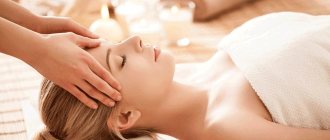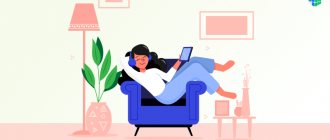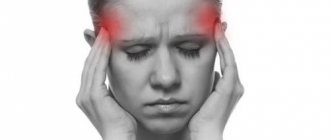When treating this symptom, an integrated approach is used that helps reduce its intensity and remove the cause of the neurotic disorder. Several types of assistance are used for this.
In life, a person faces various situations that strain his nervous system: there is no way to respond to grievances, fear arises due to a lack of a sense of security, it is not possible to implement plans, and so on. All conflict situations and shocks do not remain without a trace in the body. As a result of the action of psychotraumatic factors, a person develops the disease neurosis . It begins almost imperceptibly and manifests itself differently in everyone. Symptoms and external manifestations of the disease depend on the duration of the traumatic situation, its severity and individual reaction to it.
What is neurosis?
Neurosis is a disease in which a person loses the ability to cope with stressful situations . The body’s defenses and the formed psychological adaptation “break down” in this state, leading to exhaustion of the nervous system. This disease affects not only the psyche and the nervous system; a person often notices a malfunction of an internal organ or prolonged pain.
Subscribe to our INSTAGRAM account!
Strong neurosis does not go unnoticed from the outside either. People around note increased irritability and deterioration in the physical condition of a person suffering from this disease.
Our services in ophthalmology
The administration of CELT JSC regularly updates the price list posted on the clinic’s website. However, in order to avoid possible misunderstandings, we ask you to clarify the cost of services by phone: +7
| Service name | Price in rubles |
| Pneumotonometry | 500 |
| Tonometry (according to Maklakov) | 1 000 |
| Goldmann tonometry (Icare tonometer) | 1 000 |
| MSCT of orbits | 7 000 |
All services
Make an appointment through the application or by calling +7 +7 We work every day:
- Monday—Friday: 8.00—20.00
- Saturday: 8.00–18.00
- Sunday is a day off
The nearest metro and MCC stations to the clinic:
- Highway of Enthusiasts or Perovo
- Partisan
- Enthusiast Highway
Driving directions
Causes of the disease
- An interesting fact is that not only situations associated with the loss of something close can lead to neurosis. The cause of the disease can also be a bright, joyful event , for example, the birth of a child, a wedding, or the start of studies at the desired college or university.
- Neurosis often occurs in melancholic and choleric people. These types of temperament are characterized by emotional instability, so typical melancholic and choleric people have a more difficult time experiencing traumatic situations.
- Physical and psycho-emotional stress ultimately lead to this nervous pathology. If a person constantly works or studies and does not have enough time for relaxation and rest, he is at risk. Especially with accompanying problems in your personal life, the development of neurosis cannot be avoided.
- With long-term or intense somatic illnesses, psychological problems associated with the inability to finish the work started, symptoms of severe neurosis also appear.
Prevention of visual fatigue
The health of your eyes depends on your daily habits. Visual hygiene allows you to maintain good health and reduces eye fatigue even under conditions of increased stress.
- Sleep 7-8 hours – good and complete sleep is very important for eye health, which should last at least 7 hours. It is important that the room in which you sleep is dark;
- 2 hours before bedtime, stop using gadgets. Firstly, this way you will fall asleep easier and your sleep will be stronger. Secondly, at this time the eyes will be able to rest from irritating light. It’s better to read a regular paper book or an electronic one, but one that works on the E-Ink principle (which means “electronic ink”). No mobile phones, computers or tablets. It is also better to abstain from TV;
- Maintain reading hygiene: do not read while lying down or in moving vehicles; while reading, keep the book at a distance of 30 cm from your eyes. The light source should be located behind and slightly above;
- Include in your diet foods that are good for vision - blueberries, carrots, melon, fish, etc. A “healthy” menu alone will not be able to solve the problem, but in combination with other healthy habits, proper nutrition will have a positive effect on vision and well-being in in general;
- Make it a habit to visit an ophthalmologist once a year, even if nothing bothers you. Only timely identification of possible violations will prevent their development. Remember that you cannot always correctly assess your condition on your own;
- If you need vision correction, it is better to use glasses rather than contact lenses at the computer. Firstly, this will reduce corneal dryness. Secondly, there are special coatings for spectacle lenses that can reduce eye strain and protect them from the blue spectrum of radiation;
- It is necessary to wash your face thoroughly before going to bed. Women need to completely remove their makeup. Men should also pay enough attention to washing, since during the day dust and dirt particles settle on the eyelashes, which can get into the eyes;
- It is better not to use an eye mask while sleeping. If you can’t sleep without it, choose a product that doesn’t put pressure on your eyes or squeeze your temples, otherwise the blood circulation in your vision organs may be impaired. Remember that the mask must be washed regularly.
Sign up for a free vision test
How does this disease manifest itself?
A neurotic disorder of the nervous system necessarily leads to detrimental consequences for the body and social activity of a person. It can cause neurosis, nausea, dizziness, constant headaches, increased conflict, irritability, and disability. That is why, when neurosis manifests itself, you need to solve the problem, and not hope for its independent disappearance .
The main manifestations of the disease include:
- headaches of various types;
- numbness of the limbs;
- dizziness;
- various types of sleep disorders;
- a person cannot relax if he wants to;
- increased irritability;
- the patient does not feel joy and happiness, he is constantly depressed;
- restlessness, anxiety;
- decrease in cognitive functions, intellectual abilities;
- fast fatiguability;
- pain in internal organs, in the limbs, without obvious reasons;
- decreased labor productivity;
- mood swings;
- tearfulness;
- touchiness;
- “getting stuck” in a stressful situation;
- the body's sensitivity to temperature changes and bright light;
- disorders of the autonomic nervous system: sweating, rapid heartbeat, fluctuations in blood pressure, problems with the stomach;
- decreased sex drive;
- decrease in the intensity of volitional impulses;
- dyspnea;
- dark spots when closing or opening the eyes, the condition is accompanied by dizziness;
- decreased appetite, inability to form a bolus due to insufficient amount of saliva in the mouth;
- the appearance of a feeling of fear without a threatening factor.
Reduced severity of physiological symptoms
The listed signs manifest themselves differently in each patient. For some, neurosis is accompanied by only a few symptoms of the listed manifestations, and some note almost all of the listed changes in their body. Among the common symptoms, patients note headache, nausea, dizziness, tension in the body and head.
Tension in the body
This is the main companion of the disease. Neurotic disorders are almost always accompanied by muscle tension. This phenomenon occurs for both physiological and psychological reasons. In the human body, an uneven distribution of muscle load occurs, and dystonic reactions appear.
Some researchers argue that tension in any part of the body is associated with specific psychological problems. For example:
- Feelings of hostility towards others lead to tense arm muscles.
- Increased muscle tone in the thighs and pelvis in adulthood is caused by sexual problems.
- Tension in the head during neurosis is caused by deep emotions, unresolved conflicts, and low self-esteem of a person.
Psychological problems are very closely related to somatic manifestations. That is why it is necessary to get rid of this symptom as part of a set of measures to overcome a neurotic disorder.
With neurosis, constant tension in the body is treated not only with medications, but also with active use of physical exercises. They are prescribed depending on which muscles cannot relax. The following would be appropriate here:
- relaxation massages;
- various water treatments;
- medications for severe symptoms;
- working with a psychologist, psychotherapist to solve the cause of muscle tightness.
Nausea with neurosis
Not all doctors associate this symptom with psychological problems. Only experienced gastroenterologists or therapists refer the patient for a consultation with a psychotherapist or neurologist when experiencing nausea. Nausea with neurosis can last from several hours to several days. And it should not be associated with low-quality food and take sorbents or bacteria for the intestinal flora - there will be absolutely no result.
Constant nausea in neurosis is often observed with a feeling of disgust towards an object, person or activity, if the patient has accumulated grievances, he is dissatisfied with his life, his health or appearance. Constantly interacting with what a person considers unworthy or bad, neurosis will manifest itself through the main symptom - nausea.
There are two treatment options:
- reducing the severity of symptoms, short-term techniques using antipsychotics or antidepressants;
- long-term psychotherapy aimed at eliminating not only the symptom, but also the causes of neurosis.
Dizziness with this disease
It is enough to associate this phenomenon with the pathology of the nervous system, since dizziness during neurosis is not always accompanied by problems with internal organs. A person may complain of weakness and dizziness, although when tested, all results will be within the normal range; blood pressure measurements will also not show any pathology. In this case, we can safely say that the symptom is caused by psychogenic causes.
Dizziness occurs with depression, panic attacks, vegetative-vascular dystonia, phobias, and anxiety. It is complemented by noise in the head, increased irritability and sleep disorders. With dizziness of a psychogenic nature, it is impossible to cure a person of them without the use of psychotherapeutic techniques.
If dizziness is accompanied by hearing problems and gait disturbances, then we may be talking about disturbances in the functioning of the vestibular apparatus. In this case, an ENT doctor provides assistance. With changes in blood tests and examinations of the cardiovascular system, dizziness is caused by neurological or vascular diseases. A doctor working with a patient cannot immediately diagnose psychogenic dizziness, so first a negative diagnosis should be made - eliminating the physiological causes of the symptom.
In the treatment of dizziness due to neurosis, medications, special gymnastics and breathing exercises, as well as psychotherapeutic techniques are used.
How to reduce eye strain and prevent increased fatigue
There are several rules that must be followed in everyday life. Thanks to this, you can significantly reduce the strain on your eyesight, and your eyes will tire much less.
If you work at a computer, then the first thing you need to do is organize your workspace correctly.
- It is important that the workplace is well and evenly lit. Do not allow the sun's rays to shine directly into your eyes or onto the monitor screen; it is better if you sit sideways to the window. There should also be blinds on the window so that on sunny days you can control the light intensity - if the light is too bright, the eyes get tired faster.
- It is better if you work on a high-quality LCD or plasma monitor, preferably with a large diagonal. Experts recommend choosing monitors with a flicker frequency of 60 to 100 Hz. Be sure to adjust the brightness and contrast of the image to your liking. Remember that an overly bright screen will strain your eyes.
- Adjust the monitor to your posture: the center of the monitor should be 10-20 cm below your eyes. The distance to the screen from the eyes should be at least 60 cm.
- If possible, reduce computer work to 4 hours a day;
- Take breaks while working every 20 minutes. At this time, you cannot switch to mobile gadgets, since pauses will be of no use in this case. It’s better to do the light eye exercises we talked about above. But before performing gymnastics, you need to consult with a specialist
and make sure that you have no contraindications to this; - Provide air humidification - buy a special device and install it next to your workplace;
- Regularly use moisturizing drops selected under the supervision of an ophthalmologist;
- Try to blink more often;
- Use special glasses for working on a computer; they block the blue spectrum of radiation emitted by the monitor and reduce eye strain.
Headache due to neurosis, causes
Headache is a faithful companion of neurasthenia and hysteria; it is practically not observed in obsessive-compulsive neurosis. This symptom does not occur immediately after a stressful situation, but after a certain period of time, after the development of other symptoms, for example, sleep or appetite disorders.
Headache with neurosis manifests itself in different ways, depending on the location of pain and the human organs involved. It develops due to:
- Muscle “clamps”.
- Disturbances in the functioning of cerebral vessels.
- Without disruption of muscles and blood vessels.
As a result of this classification, the symptoms of headaches with neurosis will be slightly different.
Neuromuscular pain is accompanied by:
- feeling of squeezing of the head;
- numbness of some parts of the surface of the head;
- sensation of pain on the skin surface of this part of the body;
- a person feels constant tension in the head, which interferes with mental processes: it is difficult to remember something, concentrate attention, or decide.
The neurovascular nature of pain will be expressed through the following symptoms:
- throbbing pain in the head;
- pulsation constantly focuses a person’s attention on pain, he cannot perform any complex mental work;
- often localized in the temporal region, occipital and frontal;
- accompanied by nausea and weakness.
Headache without muscle tension and pulsation in a neurotic disorder occurs after overwork. It does not have a clear localization, and it is difficult to understand the nature of the pain. Its occurrence is associated with psycho-emotional experiences, so it is classified as neurotic symptoms.
Treatment
Before prescribing treatment, the ophthalmologist will conduct an examination and make a diagnosis. As a rule, the main stages are measuring intraocular pressure, examining the fundus, and examining with a slit lamp. This set of examinations allows you to identify the main and most common eye diseases.
In the case of glaucoma, special medications will need to be dripped into the eyes to reduce intraocular pressure. In most cases, you will need to prepare for surgery - glaucoma does not respond to conservative treatment.
If the pain is caused by an inflammatory disease, then you will need to identify the pathogen and start taking appropriate medications: antibacterial or antiviral.
Treatment for pain caused by fatigue involves following basic visual hygiene recommendations. The patient will have to be more attentive to his health. This pathology is most often found among office workers, and it has even been called visual fatigue syndrome. An ophthalmologist may prescribe eye exercises and recommend coming for preventive examinations.
How to get rid of neurotic headaches?
It is important for patients with a neurotic disorder to know how to relieve tension and pain in the head during neurosis, because their livelihoods depend on it. When treating this symptom, an integrated approach is used that helps reduce its intensity and remove the cause of the neurotic disorder. To achieve this, several types of patient assistance are used.
Medication assistance
With neuroses, pain in the head can be simply unbearable. A constant feeling of heaviness, constriction and increased severity of pain leads to a deterioration in the patient’s psycho-emotional state. He becomes irritable, gets tired quickly, and does not want to use anything for food, since the chewing process also causes pain. To solve this problem, it is necessary to use medications to get rid of headaches. To do this, the doctor prescribes:
- sedative herbal preparations (Valerian, Peony Tincture, preparations with motherwort, Nervo-Vit);
- painkillers that relieve muscle or vascular spasm (Spazmolgon, Riabal, Novigan, various analgesics and others);
- vitamins to support the functioning of the heart and nervous system (various vitamin complexes with vitamins C, group B, magnesium, iron and other microelements);
- nootropics and anti-anxiety drugs (Glycised, Glycine, Nootropil, Pantogam), they have a good effect on brain function and normalize sleep, but the dosage and course of administration are determined only by a doctor.
Psychotherapeutic assistance
Psychological techniques are used not only to treat headaches, but also to get rid of the causes of neurosis. Cognitive behavioral therapy is actively used, hypnosis is an effective assistant, and it is also important to use positive therapy methods to restore a person’s psycho-emotional sphere. Long-term work with a psychologist or psychotherapist is required.
Lifestyle change
Often a person causes himself to develop neurotic headaches by exposing himself to excessive mental or physical stress.
To avoid the development of this symptom into pathology, restoration of the body's strength is required: healthy sleep, work and rest regime, you can help yourself by using aromatherapy, therapeutic exercises, doing massages, water procedures, tuning into the positive and learning positive thinking. Published by econet.ru.
PS And remember, just by changing your consciousness, we are changing the world together! © econet
conclusions
Simple gymnastics, which should be performed regularly throughout the day, will help quickly relieve eye fatigue. But this is not enough! To make your eyes less strained and tired, it is important to provide the right conditions:
- Organize your workplace according to all the rules;
- Install a humidifier near your workplace;
- Use moisturizing drops throughout the day;
- During work, stop every 20-40 minutes to perform gymnastics;
- Turn down the brightness of your monitor and mobile gadget screens;
- Do not read in moving vehicles;
- Choose paper books or electronic ones using E-Ink technology;
- If possible, reduce your time working at the computer to 4 hours a day;
- 2 hours before bedtime, do not use mobile gadgets and computers;
- Get examined by an ophthalmologist at least once a year.
Remember that before performing gymnastics you need to consult an ophthalmologist! Moisturizing drops should also be selected by a specialist.











